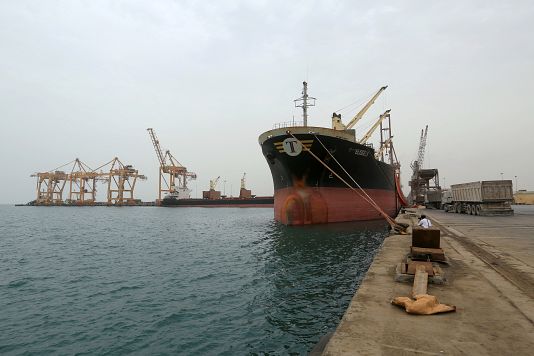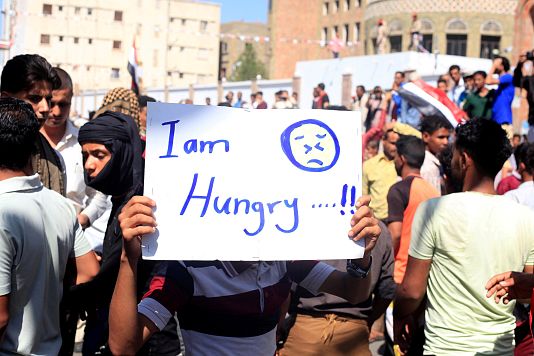The WFP will double food aid to Yemen as the government announces a new push to seize key port.
The World Food Programme plans to double its food assistance plan for Yemen to "avert mass starvation" which it hopes will reach up to 14 million people.
 ADVERTISEMENT
ADVERTISEMENT
 ADVERTISEMENT
ADVERTISEMENT
The UN agency said in a statement on Thursday, the country is "the largest hunger crisis in the world. Millions of people are living on the edge of famine and the situation is getting worse by the day".
The WFP in its last report in March 2017 said 6.8 million people were living in an “emergency” but stopped short of declaring famine. While the UN issued a stark warning last month that Yemen could be facing "the worst famine in 100 years".
We keep hearing Yemen on the 'brink' of famine, is that changing?
According to Francis Mwanza Head of the London office for the WFP, the country cannot be categorised as fully being in a state of famine until it is classified as such in an Integrated Phase Classification (IPC) assessment.
Mwanza told Euronews those results are expected in mid to late November. He added, "one of the big issues has always been access" across the country. He also believes researchers are ensuring the areas are extensively covered.
The IPC report will monitor a number of factors and will use a classification scale to look at the extremity of food shortages and the rate of acute malnutrition.
Nevertheless, the UN food body is trying to prevent that situation. Mwanza said: "We’re doing everything we can to avert the famine, Were providing more than 7 million people with food assistance every month."
As well as providing food assistance, the WFP tries where possible to send aid via cash-based transfers.
However, Mwanza warned that due to the incessant violence in the region, it is becoming increasingly clear that the number of people in need of food aid may increase to 14 million from the current 7-8 million.
That figure would mean nearly half the population would have so little to eat that they are just one step away from starvation.
Why is Hodeidah important in the battle?
Yemen has been in the grip of a war between a Saudi-led coalition and the Iran-allied Houthis for nearly four years.
The Houthi-held Red Sea port of Hodeidah has become a key battleground in the war. It is an entry point for 70 percent of the country's food imports and aid relief.
On Friday, Yemeni forces backed by the Saudi-led coalition said it had launched a "vast offensive" to take back control of the port city.
The coalition and its allies have intensified attacks on the port to improve their position before UN peace talks, which have been delayed to the end of this year.
The attacks could pose obstacles for the US' attempts to end the war as the uproar over the death of the journalist Jamal Khashoggi last month appeared to have created an opportunity for the US to push for a ceasefire.
Medecins Sans Frontier, says it is the only international aid agency operating in the city. MSF's deputy head of operations, Isabelle Mouniaman, told Euronews that since last week, fighting in Hodeidah has intensified and between Monday and Friday at least 30 wounded civilians arrived in its hospital there.
She called the war "dire" and added: "the situation is so dangerous there, we have had to decrease our team there". The hospital now has two surgical teams and two anaesthetics surgeons.
Access again is another issue in reaching the wounded. Mouniaman said roads are blocked by both the coalition and the Houthi's and bombardments prevent staff from entering areas.
Yemen could become a country of "living ghosts"
"The violence must stop now to give Yemen a chance to pull back from the brink. Unless it does, this will become a country of living ghosts, its people reduced to sacks of bones," Mwanza said.
He believes the food crisis is "man-made" as it is the conflict has led to economic collapse, rising food prices, and the problems of supply and demand.
The price of basic items have increased by more than 30 percent in the last four months. In a country where even government employees are not receiving salaries, some have not been paid for two years, the daily grind for many has become almost impossible.












